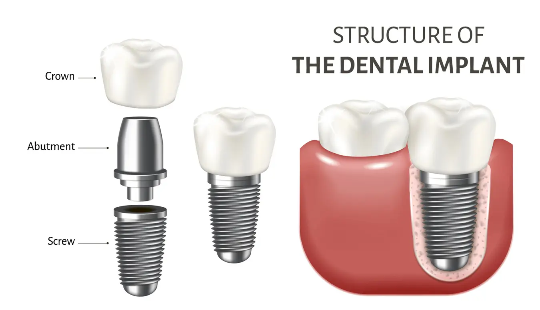Dental Implants
Dental implants are a popular and effective solution for replacing missing teeth. They are prosthetic tooth roots that are surgically placed into the jawbone, providing a stable foundation for artificial teeth or dental restorations.

Here are some important points about dental implants:
1. Procedure: The dental implant procedure typically involves several steps:
a. Evaluation and planning: Your dentist or oral surgeon will assess your oral health, examine the jawbone, and determine if you are a suitable candidate for dental implants. This may include taking X-rays or 3D scans.
b. Implant placement: During surgery, the dental implant, typically made of titanium, is placed into the jawbone. It is then left to heal and fuse with the bone through a process called osseointegration, which usually takes a few months.
c. Abutment placement: Once the implant has integrated with the bone, an abutment (connector) is attached to the implant. The abutment protrudes above the gumline and serves as a foundation for the artificial tooth or dental restoration.
d. Restoration: After the gums have healed around the abutment, a dental crown, bridge, or denture is custom-made and attached to the abutment, completing the dental implant process.
2. Benefits: Dental implants offer numerous advantages:
a. Improved appearance: Dental implants closely resemble natural teeth, enhancing your smile and facial aesthetics.
b. Functionality: They restore the ability to bite and chew properly, improving speech and allowing you to enjoy a wide range of foods.
c. Durability: Implants are designed to be a long-lasting solution, with proper care and maintenance.
d. Bone preservation: Dental implants stimulate the jawbone, preventing bone loss and preserving the overall structure of the face.
e. Convenience: Unlike removable dentures, dental implants are permanent and do not require adhesives or removal for cleaning.
3. Candidacy: Not everyone is a suitable candidate for dental implants. Factors that can affect candidacy include the quantity and quality of the jawbone, overall oral health, and general health conditions. Your dentist or oral surgeon will evaluate your specific situation and determine if dental implants are right for you.
4. Care and Maintenance: Dental implants require regular oral hygiene practices, such as brushing, flossing, and routine dental check-ups. Additionally, avoiding habits like smoking and maintaining a healthy lifestyle can contribute to the long-term success of dental implants.
It’s important to consult with a qualified dentist or oral surgeon who specializes in implant dentistry to determine if dental implants are the best treatment option for your specific needs. They can provide a comprehensive evaluation and guide you through the implant process.
Copyright © Finedent Dental Clinics
Design and Development Laya IT Solutions
